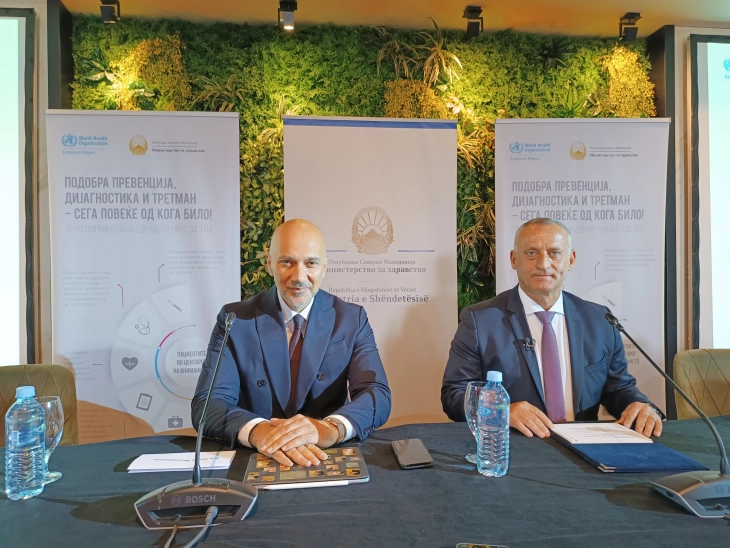Health minister: GPs, nurses to provide more services to ease strain on specialists
- The latest WHO-supported reforms to North Macedonia's health care system aim to ease the strain on specialist doctors by expanding the role of primary care physicians. From now on, general practitioners will be able to provide services such as ECG, ultrasound, Doppler, and spirometry tests, and prescribe chronic disease medications, Health Minister Fatmir Mexhiti told a press conference Monday.
- Post By Magdalena Reed
- 16:02, 21 August, 2023

Skopje, 21 August 2023 (MIA) — The latest WHO-supported reforms to North Macedonia's health care system aim to ease the strain on specialist doctors by expanding the role of primary care physicians. From now on, general practitioners will be able to provide services such as ECG, ultrasound, Doppler, and spirometry tests, and prescribe chronic disease medications, Health Minister Fatmir Mexhiti told a press conference Monday.
Focused on tackling the country's chronic disease burden, these reforms would integrate health services and modernize the system, Minister Mexhiti said.
"We will also make it possible for a larger number of general practitioners to specialize in family medicine so patients can receive as many services as possible at the same doctor's office," he added.
He said the Ministry of Health would be promoting the changes this week.
"We have printed information brochures with the support of the WHO. Seven hunderd family doctors have completed courses on the new drug prescription rules. And, over the next few days, we are planning to visit several health centers nationwide to present these changes to patients and doctors," Mexhiti said.
According to him, the changes would reduce the financial burden on patients as well. People from other towns would not have to waste time and money to see medical specialists in Skopje, he said; instead, he said, they would be able to have their chronic disease medications prescribed by their local GPs.
"This is one of the first major changes that will happen in primary care. You know, if you have a sick family member, you are supposed to come to Skopje that day and waste a day and spend at least 2–3,000 denars on transportation. Patients know this very well," Mexhiti said.
"All other changes will follow," he said, pointing out that "we are once and for all decentralizing health care."
"And one thing should be clear to you and to the entire public, once and for all. Things in health care will start being solved when we have a good foundation, when we introduce these changes in primary care," Mexhiti said.
Primary care reform coordinator Zlate Mehmedovikj also addressed the press conference. He spoke about recent WHO-supported research done in the country that showed people with chronic medical conditions were often being diagnosed late.
"Hypertension and diabetes are usually diagnosed late, when people show symptoms or develop complications in hospital settings," Mehmedovikj said.
Speaking about primary care physicians, he said they had the necessary expertise to provide services and medications for chronic disease management in line with expert guidelines.
"The list of drugs and laboratory referrals that family physicians may prescribe has been expanded," Mehmedovikj said.
"The doctor and nurse team at the primary care level knows exactly what, where and how it should be done to improve your health. They monitor chronic diseases and can control them better. Our vision for a better health care system is more health [services] closer to where you live," he added.
According to Mehmedovikj, the reform will provide more opportunities for general practitioners to sub-specialize in family medicine.
Also in the works, he added, were upgrades to the electronic system of making doctor's appointments.
Select doctors' offices would also be provided with equipment including otoscopes, rhinoscopes, ophthalmoscopes, blood pressure monitors, stethoscopes, ECG machines, and nebulizers, he said. mr/







